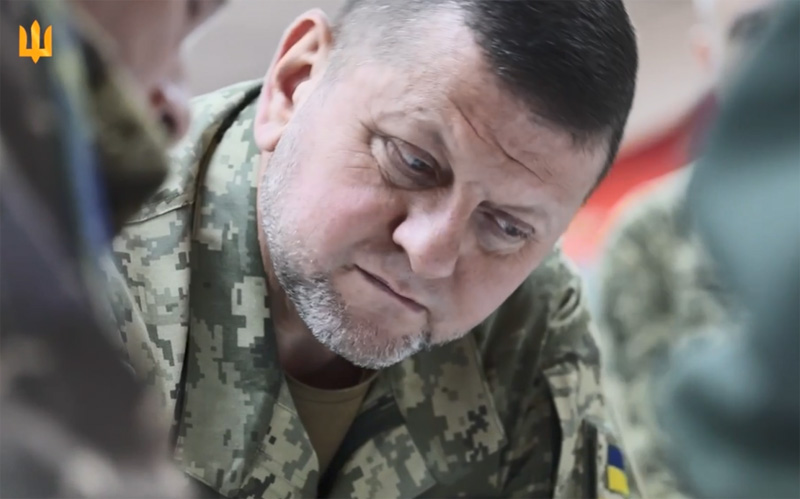Стратегическое расхождение. Почему на Западе не хотят отставки Залужного


Вашингтон с Лондоном среагировали не на сам тот факт, что Зеленский захотел отправить Залужного в отставку. Они среагировали на причину отставки
В западных медиа прокатился вал публикаций о проблемах в отношениях между высшим политическим и военным руководством Украины. Поводом, конечно, стала история, как Владимир Зеленский решил снять Валерия Залужного с поста главнокомандующего ВСУ, а затем передумал. Но пусть отставка и не состоялась, проблемы в отношениях никуда не делись. И многие медиа акцентируют именно на этом. Достаточно посмотреть на заголовки некоторых публикаций. The New York Times: «Последний вызов для Украины — растущая напряженность между топ-лидерами». The Economist: «Вражда между президентом Украины и главнокомандующим армии набирает обороты». The Spectator: «Соперничество Зеленского с Залужным — плохие новости для Украины».
Западное «вето»
В принципе, когда растет напряженность между политическим и военным руководством, эту проблему нужно решать. И стандартный выход — это отставка именно военного руководства. «Президент имеет право сменить командира, которому он больше не доверяет: подчинение военных гражданскому руководству является краеугольным камнем демократии», — подчеркивает The Economist.
Журнал отмечает, что гражданские лидеры нередко меняют командиров, даже высших, во время войны. Иногда это происходит из-за неповиновения генералов, в других случаях их увольняют за плохую работу и военные ошибки. Военная история также изобилует случаями освобождения командиров по менее благородным причинам. Генералы часто являются героическими и отважными фигурами, затмевающими своих политических руководителей благодаря либо боевым успехам, либо саморекламе, либо и тому, и другому. Это порождает зависть и обиду, подчеркивает The Economist и приводит целый ряд примеров всех этих вариантов из американской, британской и израильской истории.
В любом случае, каковы бы ни были мотивы Зеленского, аксиомой демократии является право гражданского руководителя страны отправить в отставку военного командующего. И в нынешней ситуации странно выглядит то, что Зеленский вдруг передумал.
Более того, ключевую роль в этом, похоже, сыграли именно западные партнеры. Например, The Times пишет, ссылаясь на источники, близкие к Залужному, что после того как Залужный объявил своим заместителям о том, что Зеленский его уволил, свою обеспокоенность выразили международные партнеры, в том числе США и Великобритания, и под их давлением Зеленский «был вынужден отменить свое решение». О том же рассказали собеседники «BBC News Украина» в украинской власти: «В ситуацию вмешались западные партнеры Киева, которые выразили резкое неприятие отставки Залужного».
По-видимому, Вашингтон и Лондон использовали не только уговоры, но и более серьезные аргументы, чтобы заставить Банковую отказаться от решения, которое они считали сумасшедшим. Британский политолог Марк Галеотти утром 30 января рассказал в The Spectator: «Высокопоставленный европейский дипломат, занимающийся украинским вопросом, вчера вечером в ужасе и недоумении написал мне, что в их посольстве в Киеве вчера сообщили о военных перестановках. Сегодня утром они сообщили, что «Банковая, похоже, пришла в себя».
Украина сейчас полностью зависит от западной военной и финансовой помощи. И нет ничего удивительного в том, что Запад использует этот факт как основание для того, чтобы накладывать «вето» на некоторые решения Банковой. Вопрос в другом: зачем Западу понадобилось принуждать Зеленского оставить Залужного на своем посту, несмотря на то, что отношения в этом тандеме очень далеки от идеальных?
Тривиальные аргументы
Есть несколько тривиальных аргументов, которые выглядят правдоподобно. Тем не менее, они недостаточно весомы и убедительны.
Первый аргумент — это, конечно, выигрыш Кремля от любых ссор в украинском руководстве. Например, The Economist констатировал, что российские пропагандисты радостно выплеснули насмешки в адрес Украины, и процитировал главреда рупора Кремля Russia Today Маргариту Симоньян: «Сняли Залужного или не сняли — бардак на хуторе для нас полезен». А статья в The Guardian о попытке Зеленского уволить Залужного завершается мнением эксперта британского аналитического центра Chatham House Орыси Луцевич: «Учитывая собственные попытки России дестабилизировать украинское единство изнутри, такого рода нападение на Залужного играет на руку врагу».
Но радость Кремлю, как мы видим, доставляет любая напряженность между политическим и военным руководством Украины. Поэтому, если прямолинейно следовать этой логике, то Залужного нужно снимать именно для того, чтобы у Кремля исчезли основания для радости.
Другой тривиальный аргумент — отставка Залужного «не ко времени», ибо ссоры в украинском руководстве могут ослабить поддержку Украины со стороны западного общественного мнения. The Guardian подчеркивает, что сейчас «самый острый кризис в Украине» — не на поле боя, а в Конгрессе США, который никак не может одобрить пакет военной помощи на сумму $61 млрд. Также и The Economist отмечает, что слухи об отставке Залужного «появились в критический момент», когда Украина «сталкивается с неопределенностью относительно степени иностранной поддержки, на которую она может рассчитывать. Битва за будущее генерала Залужного вряд ли сделает возобновление финансирования более вероятным, поскольку командующий высоко ценится на Западе».
Все это, конечно, правильно, но тут можно выдвинуть аналогичное возражение. Для западного общественного мнения персоналии генералов второстепенны, ему важно, чтобы Украина демонстрировала внутреннее единство и волю к победе. В этом плане нам как раз больше всего вредят заголовки статей в западных медиа о том, что в Украине растет вражда между президентом и главным генералом. Уж лучше были бы заголовки типа «Зеленский назначил нового генерала вести армию Украины к победе».
Еще один аргумент из той же серии — боязнь потрясений в Украине в случае отставки Залужного. «Если замена генерала будет рассматриваться как чисто политическая, а не военная необходимость, г-н Зеленский может столкнуться с негативной реакцией не только оппозиционных политиков, но и общественности, которая, как показывают опросы, испытывает самое большое уважение к генералу Залужному», — рассказывает The New York Times.
Однако несостоявшаяся отставка — это тоже источник неурядиц. «По словам депутатов украинского парламента, путаница в верхах уже распространяется по украинским вооруженным силам, что влияет на моральный дух рядовых и на работу старших офицеров с коллегами из союзных вооруженных сил. Неопределенность сохраняется в отношении того, поддерживаются ли президентом приказы генерала Залужного, что подрывает доверие к иерархии командования», — рассказывает та же самая статья в The New York Times.
Несомненно, западные партнеры знают об этой проблеме. Однако они сочли ее меньшим злом, чем отставка Залужного. Почему?
Стратегический мотив
Чтобы ответить на этот вопрос, нужно сначала выяснить причину разногласий между Зеленским и Залужным. Оставим за скобками политическую ревность и возможные личные антипатии. У них двоих принципиально разное видение дальнейшей стратегии.
Напомним, что большая волна слухов о возможной отставке Залужного поднялась еще в ноябре, когда в The Economist вышла статья «Главнокомандующий ВСУ о том, как выиграть войну», которая не понравилась Банковой. Заместитель руководителя ОП Игорь Жовква в эфире телемарафона заявил, что статья Залужного якобы вызвала «панические настроения» у международных партнеров. «Мне поступил звонок одного из руководителей кабинетов лидеров [стран-партнеров], и они в панике спрашивают: «Что докладывать моему лидеру? Вы действительно в тупике?» Мы такого эффекта хотели достичь этой статьей?» — заявил Жовква.
С тех пор все стало только хуже. Разногласия усилились. А когда нет взаимопонимания насчет стратегии, тогда, конечно, и личная антипатия расцветает.
И сейчас поводом для, на первый взгляд, спонтанного и беспричинного кадрового решения Зеленского стали именно разногласия насчет стратегии.
«По словам высокопоставленных офицеров, Валерия Залужного вызвали на личную встречу с Зеленским в понедельник. Там генерал заявил советникам президента, что их оценки военной ситуации скорее позитивны, чем реалистичны. Тогда, по данным трех источников, его попросили уйти в отставку. Когда он отказался, Зеленский заявил, что подпишет указ о его увольнении», — рассказывает The Times.
Можно только догадываться, что имел в виду Залужный, называя военные расчеты Банковой «скорее позитивными, чем реалистичными» (more positive than realistic). Важно то, что именно это расхождение стало «последней каплей».
И Вашингтон с Лондоном, в свою очередь, среагировали не на сам тот факт, что Зеленский захотел отправить Залужного в отставку. Они среагировали именно на причину отставки.
Потому что стратегия Залужного — это и есть стратегия Запада. Как отмечает The Financial Times, «замена Залужного может нервировать западных партнеров Украины, в том числе военных чиновников, которые в течение последних двух лет тесно сотрудничали с генералом при разработке стратегии ведения боевых действий».
Это не означает, конечно, что между Залужным и западными командующими всегда идеальное взаимопонимание. Наверное, между ними бывали серьезные споры. Но это были дискуссии между специалистами в военном деле, и в этих спорах рождались конкретные решения, которые затем утверждались западными президентами и премьерами.
Можно понять, чего сейчас боятся наши западные друзья. Боятся они того, что после отставки Залужного на его место придет человек, которые будет продвигать планы «скорее позитивные, чем реалистичные». Более того, эти опасения подтверждаются списком возможных преемников: начальник ГУР МО Кирилл Буданов и командующий Сухопутных войск Александр Сырский. «Оба считаются близкими к президентской команде», — подчеркивает The Economist и отмечает, что Буданов не имеет опыта командования крупными войсками. А Сырский, напоминает The Economist, руководил «возможно, бессмысленной обороной небольшого городка Бахмут», тогда как «между президентским дворцом и генеральным штабом велись ожесточенные дебаты по поводу военной стратегии, включая спор по поводу Бахмута».
Резюмируя, можно сказать, что проблема гораздо глубже, чем просто плохие личные отношения между Зеленским и Залужным. Тут расхождение стратегическое, и в случае отставки Залужного оно не исчезнет, а наоборот, обострится.
Чего ждать дальше
Есть два варианта развития событий: «позитивный и реалистичный». На «позитивный» рассчитывают военные. The Times приводит слова «доверенного лица генерала» Залужного: «Зеленский должен понять, что военные доверяют Залужному, и если президент хочет, чтобы военные доверяли ему, он должен научиться доверять Залужному. Советники, близкие к Зеленскому, налили ему теплую ванну, за пределами которой трудно увидеть реалии фронта». Ждать от Зеленского, чтобы он стал слушать военных, а не своих советников, это конечно, пожелание «скорее позитивное, чем реалистичное».
«Реалистичный» вариант — все будет так, как есть, или хуже. Но с точки зрения Запада, это все равно лучше, чем если Банковая начнет сама командовать ВСУ во время войны.
Recent Posts
Сбежавший в Швейцарию блогер Станислав Домбровский просит прощения у украинцев
Одесский трэш блогер Стас Домбровский, который в последнее время проживает в Швейцарии, записал видеообращение к…
Александра Устинова и атака на руководство АОЗ: что стоит за волной критики
Александра Устинова, народная депутат, которая в последние дни активно атакует Агентство оборонных закупок (АОЗ) возможно…
Журналисты показали имение киевской судьи, закрывшей дело Приходько
Свобода "под ключ" или манипуляция правосудием? Борис Приходько – нацбанкир времен Януковича и действующий нардеп…
Судьи вне закона
В течение последних трех лет внимание общественности если и бывает приковано к судам, то гораздо…
Артем Ляшанов и bill_line спасают репутацию через суд
Финтех-компания столкнулась с обвинениями в отмывании денег игорной мафии. ООО «Тех-Софт Атлас» (ТМ «bill_line») и…
Криптобиржа WhiteBIT: как Владимир Носов и «регионалы» Шенцевы отмывают деньги и помогают спецслужбам России
Владимир Носов в Украине пытается позиционировать себя как респектабельный бизнесмен и хозяин криптобиржи WhiteBIT. Однако…


